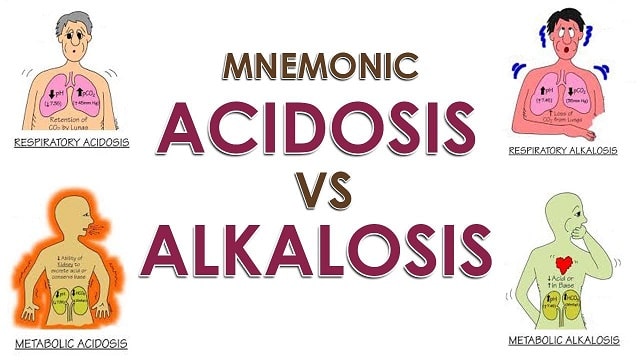Alkalosis
Alkalosis is a medical condition that occurs when the pH level of human blood rises above the normal value, which is around 7.35 to 7.45. Under normal circumstances, human blood pH is well maintained in this range because it plays an important role in healthy body functions. However, when blood pH is too high, it can have negative effects on the human body.
Alkalosis can be divided into two types, namely respiratory alkalosis and metabolic alkalosis. Respiratory alkalosis occurs when a person hyperventilates or takes in too much oxygen. While metabolic alkalosis occurs when the body loses too much acid or produces too much bicarbonate.
Symptoms of Alkalosis
Minimal alkalosis can cause some unpleasant symptoms, although they are usually not serious. Some of the most common symptoms of minimal alkalosis include:
- Tingling and numbness in the hands and feet
- Unusual tiredness and fatigue
- Muscle cramps or spasms
- Headache
- Sleep disturbance or insomnia
If the condition is not treated immediately, symptoms will get worse and can progress. These symptoms can lead to shock or even coma. Call emergency medical care immediately if someone experiences symptoms such as:
- Dizzy;
- Difficulty breathing;
- Confusion;
- Faint;
- Coma.
Risk Factors for Alkalosis
The following risk factors can increase the risk of alkalosis:
- Chronic lung disease;
- Chronic lung infection;
- Chronic kidney disease;
- Acute kidney injury;
- Loss of excessive fluids (dehydration)
Causes of Alkalosis
There are several factors that can cause alkalosis. Some of them include:
- Hyperventilation
When someone hyperventilates, they take in too much oxygen and expel too much carbon dioxide from their body. This can cause the blood pH to rise, resulting in alkalosis.
- Increase consumption of alkaline foods
Foods that contain a lot of alkali, such as fruits and vegetables, can increase blood pH. If someone consumes too much of these foods, it can cause alkalosis.
- Use of certain medications
Some medications, such as diuretics and antacids, can cause the body to lose acid and lead to alkalosis.
Diagnosis of Alkalosis
The symptoms of this condition can be similar to other medical conditions, so it’s important not to try to diagnose yourself. Make an appointment with your doctor to have a health evaluation. Your doctor will ask about your medical history and symptoms. They will likely order tests to rule out other conditions. Common tests include:
- Urinalysis;
- Urine pH level test;
- Basic metabolic panel;
- Arterial blood gas analysis.
Complications of Alkalosis
The following are some complications that can occur in alkalosis:
- Paralysis
Severe alkalosis can cause paralysis, which usually begins in the hands and feet. This condition results from decreased levels of calcium ions in the blood, which affects nerve and muscle function.
- Seizures
Alkalosis can increase the likelihood of seizures. This is because high blood pH can affect nerve activity and trigger seizures.
- Calcium Loss
Alkalosis can cause calcium loss from the bones and can affect long-term bone health. This is especially true in metabolic alkalosis, which is usually due to loss of stomach acid or the use of certain medications.
- Electrolyte Imbalance Disorders
High pH levels can affect the electrolyte balance in the body, which can affect the function of organs and systems in the body. Alkalosis can cause disturbances in sodium, potassium, chloride, and magnesium levels, which can affect general health and fluid balance in the body.
- Heart Failure and Death
Severe alkalosis can affect heart function and can lead to heart failure or death. This is especially true of severe respiratory alkalosis, which is usually the result of a serious medical condition, such as a heart attack or stroke.
Treatment and Prevention of Alkalosis
Treatment of alkalosis depends on the cause. In mild cases of alkalosis, treatment can be done by stopping the triggering factor, such as stopping drugs that affect the blood’s pH balance. In more severe cases of alkalosis, treatment involves providing therapy aimed at restoring the blood’s pH balance.
One treatment for alkalosis is the administration of intravenous fluids containing sodium chloride (NaCl) or sodium bicarbonate (NaHCO3). This therapy aims to increase chloride levels in the blood and reduce bicarbonate levels.
If alkalosis is caused by hyperventilation (breathing too fast), then the treatment that can be done is to reduce the frequency and depth of breathing. This therapy can be done by calming the patient or giving sedatives.
It is important to identify and treat alkalosis quickly, as it can affect the function of organs such as the heart and brain. If you experience symptoms of alkalosis such as difficulty breathing, muscle cramps, or confusion, contact your doctor immediately for proper treatment.
Prevention of alkalosis is also very important, namely by maintaining the acid-base balance in the body by consuming a balanced diet and maintaining a healthy lifestyle. If you have a history of alkalosis or a disease that can cause alkalosis, do not hesitate to consult a doctor for advice and proper treatment.

